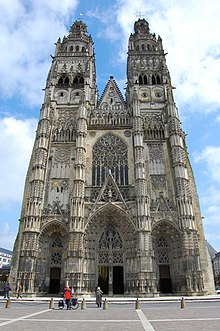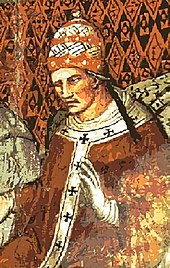
Pope Alexander III, born Roland, was head of the Catholic Church and ruler of the Papal States from 7 September 1159 until his death in 1181.

Pope Adrian IV was head of the Catholic Church and ruler of the Papal States from 4 December 1154 to his death in 1159. He is the only Englishman to have been pope.
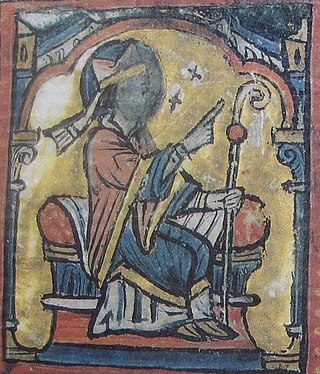
Pope Clement III, was the head of the Catholic Church and ruler of the Papal States from 19 December 1187 to his death in 1191. He ended the conflict between the Papacy and the city of Rome, by allowing the election of magistrates, which reinstalled the Papacy back in the city after a six year exile. Clement, faced with a deplete college of cardinals, created thirty-one cardinals over three years, the most since Hadrian IV. He died 20 March 1191 and was quickly replaced by Celestine III.
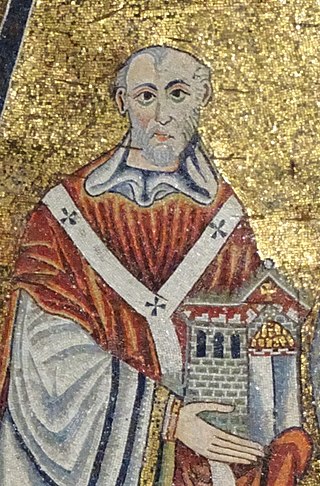
Pope Innocent II, born Gregorio Papareschi, was head of the Catholic Church and ruler of the Papal States from 14 February 1130 to his death in 1143. His election as pope was controversial and the first eight years of his reign were marked by a struggle for recognition against the supporters of Anacletus II. He reached an understanding with King Lothair III of Germany who supported him against Anacletus and whom he crowned as Holy Roman emperor. Innocent went on to preside over the Second Lateran council.

Pope Innocent III, born Lotario dei Conti di Segni, was the head of the Catholic Church and ruler of the Papal States from 8 January 1198 until his death on 16 July 1216.
The Third Council of the Lateran met in Rome in March 1179. Pope Alexander III presided and 302 bishops attended. The Catholic Church regards it as the eleventh ecumenical council.
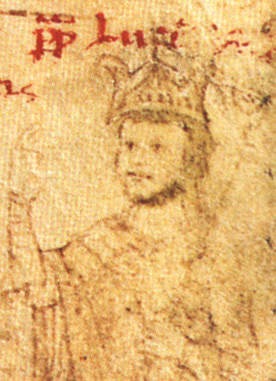
Pope Lucius III, born Ubaldo Allucingoli, reigned from 1 September 1181 to his death in 1185. Born of an aristocratic family of Lucca, prior to being elected pope, he had a long career as a papal diplomat. His papacy was marked by conflicts with Holy Roman Emperor Frederick I, his exile from Rome and the initial preparations for the Third Crusade.
Victor IV was elected as a Ghibelline antipope in 1159, following the death of Pope Adrian IV and the election of Alexander III. His election was supported by Emperor Frederick Barbarossa. He took the name Victor IV, not acknowledging Antipope Victor IV of 1138, whose holding of the papal office was deemed illegitimate.
Robert of Melun was an English scholastic Christian theologian who taught in France, and later became Bishop of Hereford in England. He studied under Peter Abelard in Paris before teaching there and at Melun, which gave him his surname. His students included John of Salisbury, Roger of Worcester, William of Tyre, and possibly Thomas Becket. Robert was involved in the Council of Reims in 1148, which condemned the teachings of Gilbert de la Porrée. Three of his theological works survive, and show him to have been strictly orthodox.
The Treaty of Benevento or Concordat of Benevento was an important treaty between the papacy of Adrian IV and the Norman Kingdom of Sicily. After years of turbulent relations, the popes finally settled down to a peace with the Hauteville kings.
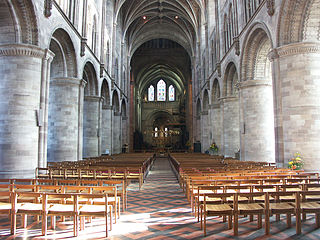
Gilbert Foliot was a medieval English monk and prelate, successively Abbot of Gloucester, Bishop of Hereford and Bishop of London. Born to an ecclesiastical family, he became a monk at Cluny Abbey in France at about the age of twenty. After holding two posts as prior in the Cluniac order he was appointed Abbot of Gloucester Abbey in 1139, a promotion influenced by his kinsman Miles of Gloucester. During his tenure as abbot he acquired additional land for the abbey, and may have helped to fabricate some charters—legal deeds attesting property ownership—to gain advantage in a dispute with the Archbishops of York. Although Foliot recognised Stephen as the King of England, he may have also sympathised with the Empress Matilda's claim to the throne. He joined Matilda's supporters after her forces captured Stephen, and continued to write letters in support of Matilda even after Stephen's release.
Ad abolendam was a decretal and bull of Pope Lucius III, written at Verona and issued 4 November 1184. It was issued after the Council of Verona settled some jurisdictional differences between the Papacy and Frederick I, Holy Roman Emperor. The document prescribes measures to uproot heresy and sparked the efforts which culminated in the Albigensian Crusade and the Inquisitions. Its chief aim was the complete abolition of Christian heresy.
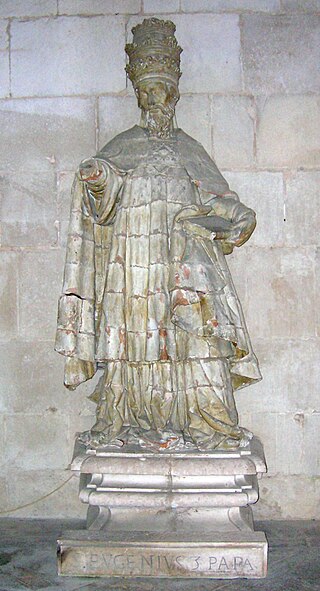
In 1148, a Council of Reims was called by Pope Eugene III to consider a variety of issues for the Church. Originally the summons to the council went out in October 1147 and it was supposed to be held in February 1148 at Trier, but conditions there were such that it was moved to Reims. A number of the bishops and other Churchmen who had been convoked did not attend and Eugene suspended many of the non-attendees, excepting the other Churchmen of Italy, who were excused. The council convened on 21 March 1148 and is said to have lasted 11 days in total, which would give an end date of 1 April 1148. However, it is possible that it was shorter, given that the large increase in the population of Reims would have strained the town's resources.

The papal election held from 4 to 7 September 1159 following the death of Pope Adrian IV resulted in the election of two rival candidates. A majority of the cardinals elected Cardinal Rolando of Siena as Pope Alexander III, but a minority refused to recognize him and elected their own candidate, Ottaviano de Monticelli, who took the name Victor IV, creating a schism that lasted until 1178.
The Synod of Verona was held November 1184 under the auspices of Pope Lucius III and the Holy Roman Emperor Frederick I.

The 1181 papal election followed the death of Pope Alexander III and resulted in the election of Pope Lucius III. This was the first papal election celebrated in accordance with the decree Licet de evitanda discordia, promulgated in the Third Lateran Council in 1179, which established that the pope is elected by a majority of two thirds votes.

Richard Barre was a medieval English justice, clergyman and scholar. He was educated at the law school of Bologna and entered royal service under King Henry II of England, later working for Henry's son and successor Richard I. He was also briefly in the household of Henry's son Henry the Young King. Barre served the elder Henry as a diplomat and was involved in a minor way with the king's quarrel with Thomas Becket, which earned Barre a condemnation from Becket. After King Henry's death, Barre became a royal justice during Richard's reign and was one of the main judges in the period from 1194 to 1199. After disagreeing with him earlier in his career, Barre was discharged from his judgeship during John's reign as king. Barre was also archdeacon of Ely and the author of a work of biblical extracts dedicated to one of his patrons, William Longchamp, the Bishop of Ely and Chancellor of England.
A papal judge delegate was a type of judicial appointment created during the 12th century by the medieval papacy where the pope would designate a local judge, often an ecclesiastic, to decide a case that had been appealed to the papal court.
The Council of Pisa, was convened by Pope Innocent II in May 1135. An extraordinary number of prelates, archbishops, bishops, monks, and abbots attended the council, including a large number of Italian clergy. The council addressed simony, schismatic clerics, heresy, as well as donations to the Templar Order. Pisa would be the third council Innocent would convene to address issues within the Catholic Church.
From the time of Constantine I's conversion to Christianity in the 4th century, the question of the relationship between temporal and spiritual power was constant, causing a clash between the Church and the Empire. The disappearance of imperial power initially enabled the pope to assert his independence. However, from 962 onwards, the Holy Roman Emperor took control of the papal election and appointed the bishops of the Empire himself, affirming the pre-eminence of his power over that of the Church. However, such was the stranglehold of the laity on the clergy that the Church eventually reacted. The Gregorian reform began in the mid-11th century. In 1059, Pope Nicholas II assigned the election of the pope to the college of cardinals. Then, in 1075, Gregory VII affirmed in the dictatus papae, stating that he alone possessed universal power, superior to that of the rulers, and withdrew the appointment of bishops from them. This marked the start of a conflict between the Papacy and the Emperor, which historians have dubbed the "Investiture Dispute". The most famous episode was Henry IV's excommunication and his penance at Canossa to obtain papal pardon. At the end of this conflict, the Pope succeeded in freeing himself from imperial guardianship. In 1122, under the Concordat of Worms, the Emperor agreed to the free election of bishops, reserving the right to give prelates temporal investiture. This compromise marked the defeat of the Empire.
